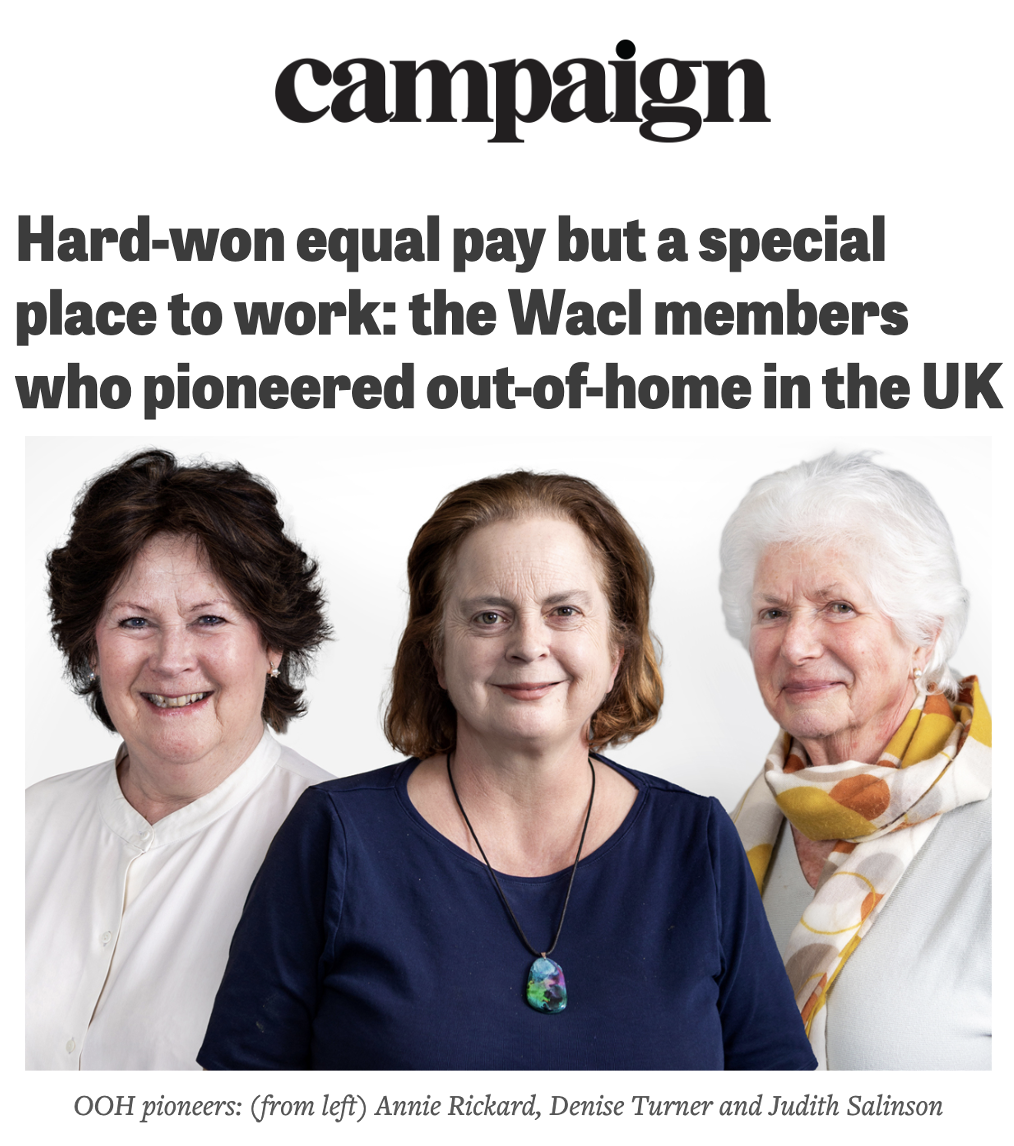
Campaign celebrates OOH pioneers
As WACL celebrates its centenary, Route Research’s CEO Denise Turner – the only female CEO of a UK JIC – interviewed club members Judith Salinson OBE and Annie Rickard about success, leadership and advice to their 18-year-old selves.
This interview was published in Campaign Magazine on June 20th 2023
Tell me about your careers?
Annie Rickard: I worked in the OOH industry for most of my career, first as a junior in an agency media department at Collett Dickenson Pearce. CDP’s media director at the time, Mike Yershon, was transforming the approach to media, including what we then called, simply, posters. Mike changed my life. I went on to be a sales executive with Judith Salinson as my boss at British Posters. After some years, Judith and I set up a business together with two other partners. The business was, in time, bought by Aegis and I then went on to develop a global network (Posterscope) through acquisitions and partnerships.
I left about five years ago and now work in OOH Capital, a partnership I set up with Tom Goddard. I also spend time with the Women’s Equality Party as chair of the steering committee and as a board director. As a longstanding member of Wacl, I’ve enjoyed the club’s 100-year celebrations. I’m confident that the club is in great hands and I’ve also felt energised to play whatever role I can in supporting it.
Judith Salinson: Following a few years in television sales, where I became one of the first female sales executives, I made the big change to outdoor, first at British Posters, then at Leo Burnett as head of local media, then an even bigger step to form outdoor planning and buying company, Harrison Salinson, in 1982 – with Annie Rickard as one of the four founding partners. At the end of the 1980s, we sold the company to the Carat Group… and, five years on, I left to develop my own consultancy, Jonpa, and enjoyed 18 years as a non-executive director for several OOH companies, new ventures and some international activities.
Right through my career I have been involved with Nabs – and I’m still a trustee. Wacl also has been, and continues to be, a very important of my life: our centenary events have shown that there is much to celebrate, more still to achieve, and a great many women making it happen.
In all industries, there are people for whom challenging the status quo led to success. I’d see you as two of those people. Having something to push against is often key, what have you pushed against in your careers?
AR: Hmmm… I feel as if I have always been pushing against something, even to this day. I think partly that is because of the fact that I was in a male-dominated environment but also it is just who I am. I am never happy with the status quo, as you put it. I still want to change the world.
In terms of my career, developing a global network was the most challenging thing I have done, particularly because the model that Aegis had at the time was for there to be several global brand leaders working with country managers and it was a matrix model. This meant that you had no command or control so you had to convince through collaboration and influence, which meant building relationships and demonstrating your value. Sometimes success was very slow to come but all the more satisfying when it did.
JS: For many years, commercial TV companies were reluctant to promote women from sales assistants to sales executives – those who went out to meet the media buyers. Entering outdoor in 1972, at the formation of the marketing company British Posters, female TV sales execs were taken on to introduce posters to the media departments who had little, or no, experience of the medium. At that time, there were more than 100 poster contractors with only one women owner. In terms of “pushing against”, it was the lack of equal pay that was an important motivational factor.
What do you think people, men and women, underestimate when it comes to being successful?
AR: I think the things that could be underestimated might be: the sheer amount of hard work and the exhaustion that can come with that; the length of time it can take to deliver lasting success; the ability to build resilience to cope with the knockbacks and setbacks that can sometimes feel very personal; the loneliness; the need to take responsibility for your actions; and the necessity of building strong teams and strong cultures.
JS: Determination, hard work and listening are key to being successful.
Technology has rightly crept into every crevice of commercial media but some things don’t change. What has always made OOH special as a place to build a career?
AR: It has to be the people. It’s funny but whenever you meet someone who has or is working in OOH, in any country, there are always lots of things you have in common and you instantly start to share. There’s an annual global OOH conference run by WOOH and about 400 people come together to listen and learn from each other and, honestly, they all talk non-stop for three days. There are friendships made that last forever, some leading to marriages; there are different generations of families who work in the business.
The industry is made up of lots of entrepreneurs, lots of independently minded and driven individuals who all want to do better. It’s like a great big club, really. That being said, there is work to be done as I don’t think there are nearly enough senior women in the business and probably not enough diversity, either.
JS: Fortunately, I retired before the huge increase in technology in OOH. Apart from during the lockdown period, when people couldn’t get out and see outdoor advertising, you simply can’t turn the medium off, posters are just there! It’s a great medium to work in.
These days, purpose and a clear ethos are essential for a business. What was your ethos at the start of your career and has it changed through your career?
AR: I think I was very much an intuitive operator, and I don’t think my values have ever changed. I believe you must be true to yourself, be open to criticism and change, to be honest and straightforward in your dealings with others and to try to be fair.
As a leader, you do often have to take tough decisions and sometimes that can mean that actions can have a negative impact on individuals. But if you behave with humanity and fairness, that is the best you can do.
JS: Having started life in commercial television, in the studios, it became engrained in me that advertising and the revenues earned from it were key to developing and improving the medium. This has remained my ethos.
What’s the single most important thing about success in business? Are any qualities not sufficiently valued these days?
AR: Well, I guess one thing is that success has to be more than just about one individual. The whole business, meaning all of the people who work there, need to feel part of that success and proud to be part of that success. An “I win, you lose” approach is, for me, not success. In terms of the second part of your question, I think everything feels a bit short term these days and it has been feeling like that for some time. To build lasting success takes a long time. I think short-lived success is easier won but if there’s no lasting impact, I wouldn’t necessarily define it as success.
JS: “Never fall out with anyone you do business with, you never know when you will come across them again…” That’s a lesson I learned early on. Personal relationships in the media business are really important. I don’t know how youngsters these days manage when they’re WFH so much. How do they get to know their clients?
What’s your advice to your 18-year-old self?
AR: Crikey – that’s a long time ago and a different world! My 18-year-old self would have been living in the 70s! I guess my advice would be to have the confidence to trust your instincts, to speak up, to have self-belief. I could have avoided many hours of agonising self-doubt if that had been the case!
JS: Go for it! Work hard, listen and learn.
What’s your advice to the next prime minister?
AR: You are probably expecting me to say this given my involvement with the Women’s Equality Party, but I will say it anyway. Can you please make it possible for more women to realise their potential? This involves the whole of society needing to change and for care – whether it be social care or child care – to be taken more seriously. Also, until violence against women and girls stops, I feel we will never have an equal society.
JS: Take great care in selecting your Cabinet, making sure you have the right balance of diversity and inclusion but not just to fill the roles. Quite honestly, who would want that job today?
Our final two questions come from Emily Alcorn, head of effectiveness at Talon, who has worked in media research for 11 years.
Many assume that women make better leaders because their emotional intelligence is something that has been missing in the workplace. Has emotional intelligence made you a better leader? If so, how?
AR: My experience is that I have worked with many women (both in my career and with the Women’s Equality Party) who put the interest of the business/project/party before their own interests and are better leaders as a consequence.
JS: I have always been a good listener, able to keep confidences. And I’ve always believed that if you hate getting up in the morning to go to your job, leave and find something else.
How did you navigate power structures early in your career compared with later in your career, when you were in more established leadership roles?
AR: In the earlier part of my career – and I don’t just mean the first few years – times were very different, and it was difficult for young women. I chose to double down, work extra hard, be the best I could, not ask for much and basically prove I was good. These days, things are better and there are lots of opportunities for women to share and support each other as they progress.
JS: Corporate management culture in my day was really against promoting women. At British Posters in the mid 70s, I was made sales manager but not allowed to be sales director with an all-male board. Yes, I could attend board meetings but I was not allowed to ask questions, only to present my sales report and budgets. Later it did change but the equal pay was still a problem.
